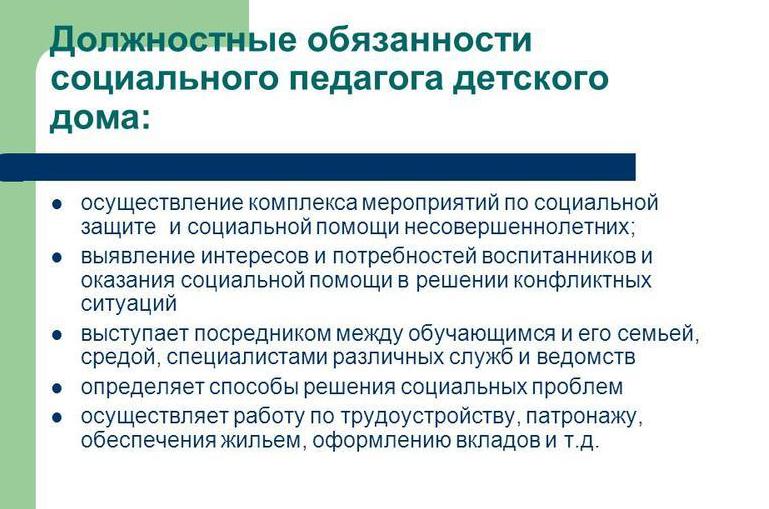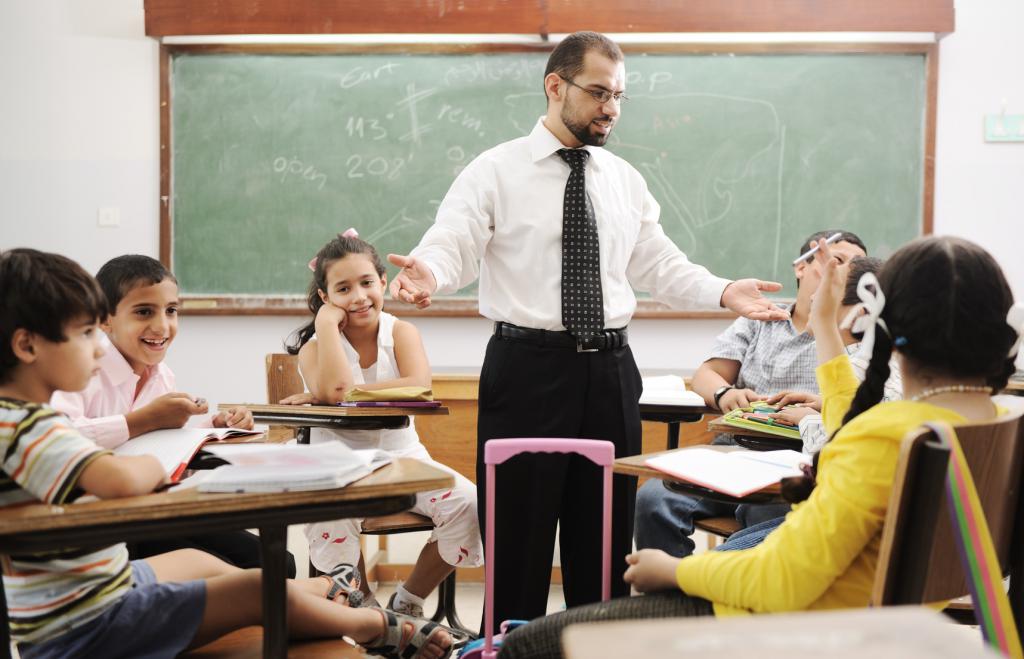The job description of a social educator is being developed by an educational institution. This post was introduced at the end of the twentieth century by decision of the Collegium of State Education of the USSR. In general, social work is an activity that is carried out by specially trained specialists. It is aimed at providing specific assistance to a family, a child, a group of people who find themselves in a difficult life situation.

Objects of work
The job description of the social teacher of the school according to GEF includes work with the following categories of students:
- children with disabilities;
- Orphans
- offenders;
- representatives of risk groups.
Objectives of the activity
The job description of the social teacher includes the following tasks:
- social and informational assistance (providing students with information on issues of protection, support, care);
- social and legal assistance (assistance in realizing the rights of the child);
- rehabilitation assistance (restoration of moral, psychological emotional health);
- medical and social assistance;
- the formation of a favorable microclimate in the microsocium of the child and in the family;
- the formation of conditions for overcoming pedagogical mistakes, conflict situations that give rise to neglect and homelessness.

Profession Features
The job description of the social educator is compiled in accordance with the regulatory legal acts operating in our country. This profession is of the type "Man - Man", it does not involve the use of technical means. Performing his functional duties, the social educator uses a computer or a typewriter. Among the means used by a social educator for work, there are:
- application of knowledge in the field of psychology, pedagogy, sociology;
- application of methods and technologies of social pedagogical work.
Among those responsibilities that include the job description of a social educator, they highlight interaction with parents and the teaching staff of the school. Also, this specialist is working with representatives of the court and the police.
The job description of the social educator at the school is drawn up for a full time (36-hour work week).
His work is carried out in a separate office, which fully comply with sanitary and hygienic requirements, as well as at the place of residence of children with whom the teacher works.
The job description of a social educator at school involves the interaction of this specialist with social protection authorities, judicial authorities, and rehabilitation centers.
The employee reports directly to the director of the educational institution. He does not have personnel subordinate; labor remuneration is carried out according to the rating grid taking into account the category and qualification category.

Professional growth
The job description of a social teacher in a preschool educational institution is developed taking into account legal documents operating in the Russian Federation. Educational institutions have vertical intraorganizational opportunities. If the teacher has a secondary specialized education, he can fulfill the duties of a teacher, a class teacher. Having a diploma of higher education, a social teacher has the right to conduct lessons, similar to a regular subject teacher.
Horizontal intra-organizational perspectives: the availability of higher education allows a social educator to rely on the position of director of the school or his deputy.
The specialist in question can also go to work in another educational institution, hold the position of inspector for minors, and get a job in the social protection authorities.
The job descriptions “Social teacher: GEF” include basic knowledge in social, age, general, educational psychology, sociology.

Training requirements
A specialist who performs the duties of a social educator should:
- own the legal framework of pedagogical and social activities;
- know the theory and history of social pedagogy;
- own methods of pedagogical and social diagnostics;
- use methods of planning professional research activities.
A specialist in this field should use the following areas of professional growth:
- be prepared for innovations in the theory and practice of social pedagogy;
- to expand theoretical knowledge and practical skills in the field of psychology, pedagogy, law, sociology;
- to be ready for personal growth (ethical and moral improvement, sociability, goodwill).
A social educator should try to systematically improve his professional level. With some questions, he turns to the school staff, as well as to the social protection authorities.

Medical contraindications
The job description of the social educator of the center for continuing education also includes medical aspects of the inconsistency of the position:
- the presence of pronounced defects in speech and hearing;
- mental and nervous diseases;
- infectious diseases.
Nowadays, teachers with secondary and higher pedagogical education work as social educators, having passed special courses in social pedagogy.
The predominant part of his working time, a social educator communicates with people. The pace of work is determined by the specialist himself, it depends on the psychological and physiological characteristics of children.
It focuses on reliability and quality. A social educator must understand that the subsequent fate of the child and the success of his socialization depend on his professionalism.
A social educator must have a good memory, constantly keep in mind various information from pedagogy, psychology, and law. Often such a specialist has to memorize the situation in the apartment of the wards, pass this information to representatives of guardianship and trusteeship authorities, as well as to the judiciary.

Useful Information
Performing his functional duties, the social teacher demonstrates to the participants in the educational process a high intellectual level, knowledge of mental operations: comparison, synthesis, analysis, generalization, concretization, abstraction. The thinking of this specialist should be critical, flexible, non-standard, to take into account all the features of underage students. The reasons for the main mistakes made by the social educator are the lack of knowledge in the legal field, reduced ability to reflect, negative motivation, stress.
Conclusion
A social educator works in close contact with dysfunctional families, children with deviant behavior. Specialists in this area are forced to make responsible decisions that relate to the fate of other people, for example, they become the initiators of depriving parents of their rights to raise a child.
For this reason, a social educator must be a mature person, able to withstand any pressure, withstand stress.
Among the communication skills that a social educator must possess, we single out the ability to interact with people of various social groups and layers, hear and listen, enter a situation, establish contact, collect information about the child, develop and create positive relationships with parents.
